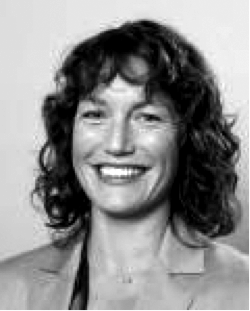

Daryl Haggard grew up in New Mexico and attended St. John’s College, where she received a bachelor’s degree in philosophy. She spent a year in China and worked in Silicon Valley before pursuing a degree in academia. She received her master’s degree in physics from San Francisco State University and her doctorate in astronomy from the University of Washington. She is currently conducting research on supermassive black holes (SMBHs).
Q: What got you interested in astronomy, and why did you want to study it?
A: I grew up in northern New Mexico, so it was very dark and you could see the stars really well. That probably gave birth to some of my interest — just having beautiful night skies to look at. I really got interested in astronomy specifically as something I wanted to pursue when I was an undergraduate. I did my undergraduate bachelor’s degree at a really, really small liberal arts college called St. John’s College that does only classics, and while you do a bit of math and astronomy there, it was much more on historical context.
Then in my junior year, we were working directly out of Newton’s “Principia,” and our professor was telling us that in our own solar system, you can actually take spacecraft that you launch off of the Earth’s surface and slingshot it off of the gravitational field of outer planets in order to project it into the outer solar system. I thought that was so cool, and it was awesome to have studied a historical text and to see that it had repercussions for how we manage our space programs. I decided then that I thought astronomy was going to be going to be a really cool thing to pursue, and of course I graduated with a degree in philosophy.
Q: Why did you want to come to Amherst and teach here?
A: As you can tell, I too have a liberal arts background, so that might not have come as much of a shock. Amherst is an amazing institution because you have this open curriculum where students can explore a lot. They can focus on a subject area they are interested in, but also kind of explore, tinker a bit, look around and see if there are other things that inspire them. As a scientist, it’s also particularly awesome here that I have so much support for both education and research.
Q: What research are you doing at Amherst?
A: I have only been here for a few weeks, so things are still in their early stages, but my research is on SMBHs. I study SMBHs, mainly how they grow and collect material. My dissertation work was this large survey program where I just looked at statistical characteristics of a big population, but more recently, I have been studying the SMBH that lives in the middle of our Milky Way galaxy. A few years ago, there was an exciting result that showed that there was a little gas cloud falling in towards this SMBH and that this gas cloud might get shredded apart and sort of gobbled up. I’ve been observing that interaction in particular with X-rays and radio waves, sort of the two ends of the spectrum, and watching to see exactly how the gas cloud interacts with material in the galactic center and in the SMBH itself.
Q: What do you hope to contribute to Amherst during your time here in the astronomy department?
A: The astronomy department is not new here, but it’s just newly reborn. Nicolas Callan and I are the two astronomers who were recently hired, and the awesome thing is that we get to just completely reinvent astronomy here. We have an opportunity to go in and engineer a major that we think sounds really exciting and reflects the skills, the knowledge, and the background that students would need to go out and work professionally in astronomy. We have been able to patch together some really great basic courses that span astronomical sciences, physics, mathematics, statistics and computer science.
Q: What classes do you teach this semester?
A: This term, I am teaching Astronomy 111, which is called Exploring the Cosmos. It is a big overview of modern astronomy, so we do a little bit of historical stuff in the beginning, but we spend most of our time talking about our current knowledge about light, radiation, galaxies, black holes and cosmology.
Q: What classes are you teaching next semester?
A: I will be teaching the first installment in our astrophysics series for the major, so that will be a much closer look at stars and galaxies. I will also be teaching a 200-level topical course on black holes — you need one math and one physics course, but you can take it concurrently to be in the class, and we will be talking about observations and a little bit of theory. I think that’s going to be a really fun and interactive course.
Q: Do you have any hobbies that you do in your spare time?
A: I am a mom, so that’s my No. 1 hobby. I have a five-and-a-half-year-old — he is totally awesome. I also love to do yoga and hike. My family is really outdoorsy, so since we have been here, my husband has been developing a lot of rock climbing areas. We don’t own a car, so we spend a lot of time on bikes; we are a very bike-intensive family.
Q: What aspects of Amherst do you like so far?
A: I love the people. We have been really lucky to come into a department that has been really supportive and welcoming. My interactions with students have been great, too. I have gone out on a Take Your Professor Out dinner, which was really enjoyable. The students have been very curious and willing to take on some tough material in our class, which may not be what they were expecting.